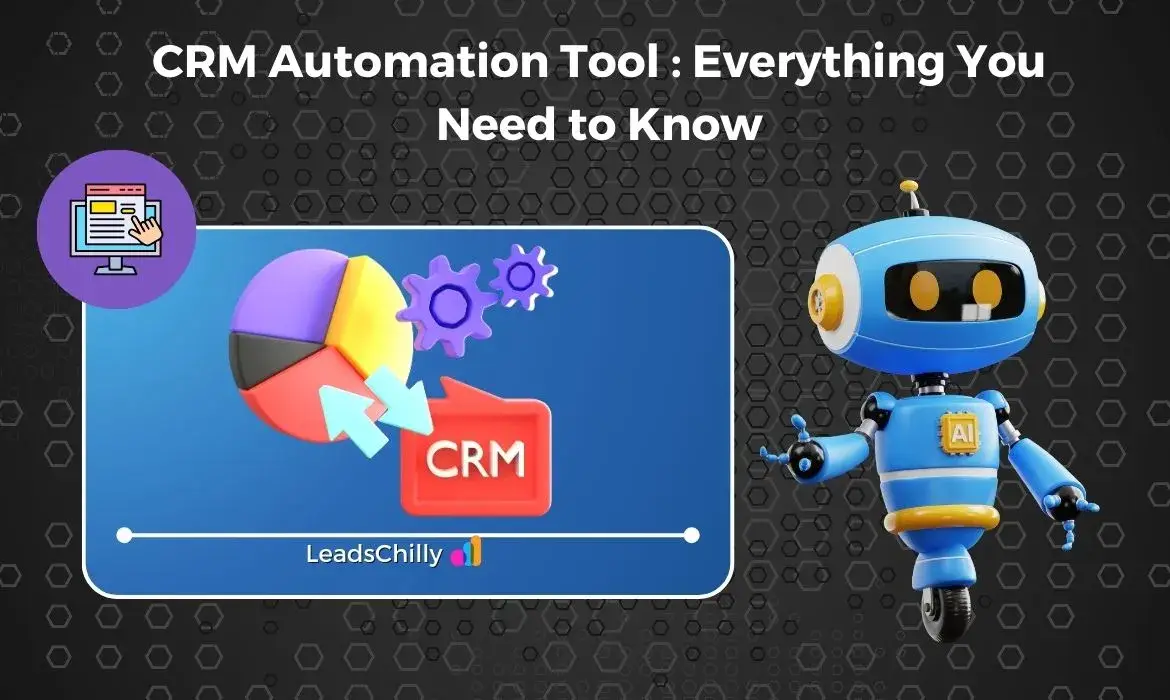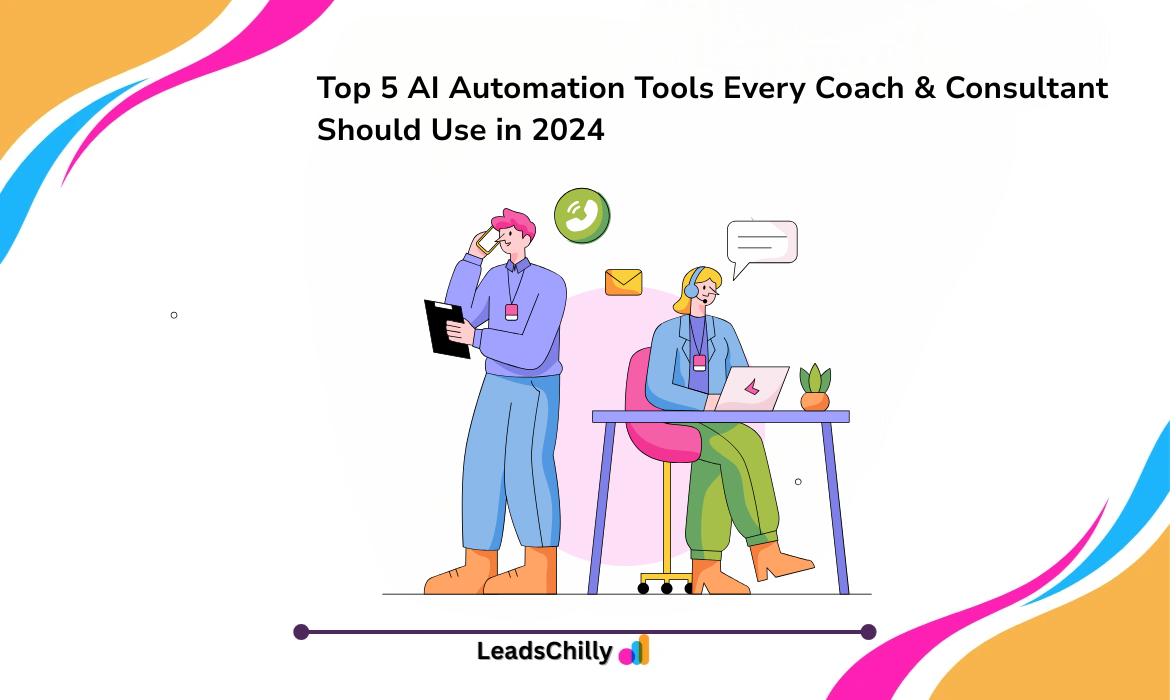In today’s fast-paced business world, managing customer relationships efficiently is more important than ever. CRM automation is a powerful solution that helps businesses streamline their operations by automating repetitive tasks like data entry, follow-ups, and email campaigns. This not only saves time but also improves accuracy and enhances the overall customer experience.
Are you ready to transform your customer management processes and boost your productivity? LeadsChilly offers advanced CRM automation tools designed to help you manage leads effectively and drive sales growth. Try LeadsChilly today with our 14-day free trial and see how easy it is to optimize your CRM processes. Sign up now and take the first step towards smarter, more efficient customer management!
What is CRM Automation?
CRM automation refers to the use of technology to handle repetitive tasks within a Customer Relationship Management (CRM) system. By automating tasks such as data entry, email marketing, and follow-up reminders, businesses can streamline operations, enhance accuracy, and free up valuable time for strategic activities. LeadsChilly offers cutting-edge CRM automation tools designed to help businesses manage leads more effectively and drive sales growth.
Key Benefits of CRM Automation
- Increased Efficiency: Automate routine tasks to save time and reduce human error.
- Improved Data Accuracy: Ensure data is up-to-date and reliable.
- Enhanced Customer Experience: Deliver timely and personalized interactions.
- Better Lead Management: Automate lead scoring and nurturing.
- Cost Savings: Lower operational costs through streamlined processes.
What Does CRM Mean?
Customer Relationship Management (CRM) refers to strategies and tools designed to manage and analyze customer interactions and data throughout the customer lifecycle. CRM systems help businesses improve relationships, streamline processes, and increase profitability by providing a centralized platform for managing customer information and interactions.
Understanding CRM Workflow Automation
CRM workflow automation involves creating predefined processes that automatically trigger specific actions based on certain conditions or events. This can include tasks such as sending automated emails, scoring leads, or assigning tasks to team members. Automation ensures consistency in handling customer interactions and reduces the need for manual effort.
Examples of CRM Workflows
| Workflow Type | Description |
| Lead Nurturing | Send a series of automated emails to engage new leads and guide them through the sales funnel. |
| Customer Follow-Up | Automatically send follow-up emails or reminders based on customer interactions or time since the last contact. |
| Task Assignment | Automatically assign tasks to team members based on predefined criteria such as lead source or sales stage. |
Essential CRM Tools for Automation
When it comes to choosing a CRM tool for automation, there are several options available. Here are some of the leading tools, including LeadsChilly, that can help you optimize your CRM processes:
Salesforce
- Features: Extensive automation for sales, marketing, and customer service. Includes workflow rules, process builder, and AI-driven insights.
- Best For: Large enterprises needing robust and customizable CRM solutions.
HubSpot
- Features: User-friendly interface with powerful automation features for email marketing, lead nurturing, and sales pipeline management.
- Best For: Businesses of all sizes looking for a comprehensive and easy-to-use CRM solution.
Zoho CRM
- Features: Offers a range of automation options including workflow automation, sales automation, and integration with other Zoho products.
- Best For: Companies needing a flexible CRM solution with extensive automation capabilities.
Pipedrive
- Features: Focuses on sales pipeline management with automation features for lead tracking, email follow-ups, and task management.
- Best For: Sales teams looking for a streamlined CRM with strong pipeline management capabilities.
LeadsChilly
- Features: Provides advanced automation tools designed to optimize lead management, automate follow-ups, and improve sales efficiency. With LeadsChilly, you can easily track and nurture leads, ensuring timely and personalized interactions.
- Best For: Businesses seeking an effective solution to enhance lead management and drive sales growth. LeadsChilly’s powerful automation capabilities can streamline your processes and help you achieve your business objectives.
Key Features of a Great CRM Automation Tool
When evaluating customer relationship management automation tools, look for these essential features:
1. Customizable Workflows
The ability to tailor workflows to your specific business processes is crucial. Customizable workflows ensure that automation aligns with your unique needs and goals.
2. Integration Capabilities
Seamless integration with other tools and platforms is vital for effective automation. Ensure that the CRM tool integrates well with your existing systems, such as email marketing platforms, social media, and other business applications.
3. User-Friendly Interface
An intuitive and user-friendly interface helps your team navigate the CRM system easily and make the most of its automation features. Look for tools with a clean design and straightforward functionality.
4. Advanced Analytics
Robust reporting and analytics tools are essential for tracking the performance of your automated processes. Advanced analytics provide insights into key metrics, helping you measure the effectiveness of your automation and make data-driven decisions.
5. Scalability
Choose a CRM automation tool that can grow with your business. Scalability ensures that the tool can handle increasing workloads and adapt to changing needs as your business expands.
Benefits of CRM Automation
Implementing CRM automation offers numerous benefits for businesses:
1. Increased Efficiency
Automating repetitive tasks such as data entry and follow-up reminders saves time and reduces human error. This allows your team to focus on more strategic activities, enhancing overall productivity.
2. Improved Data Accuracy
Automated data entry and updates ensure that customer information is accurate and up-to-date. This reduces the likelihood of errors and ensures that your team has access to reliable data for making informed decisions.
3. Enhanced Customer Experience
Automation allows for personalized and timely interactions with customers. Automated emails, follow-ups, and notifications ensure that customers receive relevant information and support, leading to higher satisfaction and loyalty.
4. Better Lead Management
Automated lead scoring and nurturing processes help prioritize high-potential leads and guide them through the sales funnel more effectively. This results in increased conversion rates and improved sales performance.
5. Cost Savings
By reducing the need for manual labor and streamlining processes, CRM automation can lower operational costs. This cost savings can be reinvested into other areas of your business to drive growth and innovation.
Who is Using CRM Automation?
CRM automation is utilized by businesses across various industries and sizes. Here’s a look at some examples:
1. Retailers
Retail businesses use CRM automation to manage customer loyalty programs, personalize marketing campaigns, and track purchase behavior. Automated processes help retailers provide a consistent and engaging customer experience.
2. Financial Services
In the financial services industry, CRM automation is used to streamline client communications, manage compliance processes, and track financial transactions. Automation helps ensure timely and accurate interactions with clients.
3. Healthcare
Healthcare providers leverage CRM automation to manage patient interactions, schedule appointments, and follow up on treatment plans. Automation helps improve patient care and streamline administrative tasks.
4. Real Estate
Real estate professionals use CRM automation to track leads, manage property listings, and automate communication with potential buyers. Automation helps real estate agents stay organized and responsive to client needs.
How to Implement CRM Automation in Your Business
1. Assess Your Needs
Before implementing CRM automation, evaluate your business needs and identify which processes can be automated. Consider areas such as lead management, customer support, and marketing campaigns.
2. Choose the Right CRM Tool
Select a CRM tool that meets your specific requirements and budget. Look for features such as customization options, integration capabilities, and ease of use. Ensure that the tool aligns with your business goals and processes.
3. Set Up Automation Workflows
Configure workflows in your CRM system to automate repetitive tasks. Design workflows that match your business processes and objectives. Regularly review and update workflows to ensure they remain effective and relevant.
4. Train Your Team
Provide training to your team on how to use the CRM system and its automation features. Effective training ensures that your team can leverage the tool to its full potential and adapt to new processes.
5. Monitor and Optimize
Continuously monitor the performance of your CRM automation and make adjustments as needed. Use analytics to track key metrics and identify areas for improvement. Regularly optimize your automation processes to enhance efficiency and effectiveness.
Best Practices for CRM Automation
1. Start Small
Begin with a few key processes to automate and gradually expand as you gain experience. Starting small allows you to test and refine your automation strategies before scaling them up.
2. Keep It Simple
Avoid overly complex workflows that can be challenging to manage. Focus on automating straightforward processes that deliver tangible benefits and enhance efficiency.
3. Regular Updates
Ensure that your CRM system and automation workflows are regularly updated to reflect changes in your business processes and goals. Regular updates help maintain the effectiveness of your automation strategies.
4. Focus on Data Quality
Maintaining high-quality data is crucial for effective CRM automation. Ensure that your data is accurate, complete, and up-to-date to support reliable automation processes.
5. Leverage Analytics
Utilize analytics tools to track the performance of your automated processes and measure their impact on your business. Data-driven insights help you make informed decisions and continuously improve your automation strategies.
Conclusion
CRM automation is a powerful tool that can transform how businesses manage customer relationships and streamline their operations. By understanding the fundamentals of CRM automation, selecting the right tools such as LeadsChilly, and implementing best practices, you can leverage this technology to drive efficiency, enhance customer satisfaction, and achieve your business goals.
LeadsChilly offers advanced CRM automation solutions designed to help you optimize lead management, automate follow-ups, and improve sales efficiency. Explore LeadsChilly to discover how our tools can revolutionize your CRM processes and propel your business forward.
Frequently Asked Questions (FAQs)
Q1. What types of tasks can be automated with CRM systems?
CRM systems can automate a variety of tasks, including data entry,
lead scoring, email marketing, follow-up reminders, customer support responses, and report generation. Automating these tasks helps streamline operations and enhance efficiency.
Q2. How does CRM automation improve customer experience?
CRM automation improves customer experience by ensuring timely and personalized interactions. Automated processes, such as follow-up emails and notifications, help deliver relevant information and support to customers, leading to higher satisfaction and loyalty.
Q3. Can small businesses benefit from CRM automation?
Yes, small businesses can benefit significantly from CRM automation. By automating repetitive tasks, small businesses can save time, reduce errors, and improve lead management and customer interactions. Affordable CRM tools like LeadsChilly are available to help small businesses leverage automation effectively.
Q4. How do I choose the right CRM automation tool for my business?
When choosing a CRM automation tool, consider factors such as customization options, integration capabilities, user-friendliness, advanced analytics, and scalability. Evaluate your specific business needs and select a tool that aligns with your goals and budget.
Q5. What are the common challenges in implementing CRM automation?
Common challenges in implementing CRM automation include selecting the right tool, configuring workflows to match business processes, training staff, and ensuring data quality. Overcoming these challenges involves careful planning, ongoing optimization, and effective training.




Comments are closed.